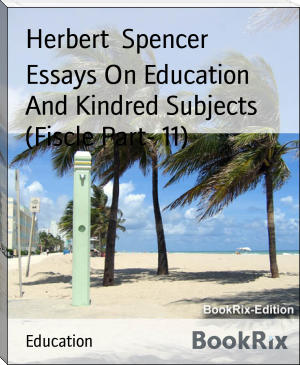Essays On Education And Kindred Subjects (Fiscle Part- 11), Herbert Spencer [historical books to read .txt] 📗

- Author: Herbert Spencer
Book online «Essays On Education And Kindred Subjects (Fiscle Part- 11), Herbert Spencer [historical books to read .txt] 📗». Author Herbert Spencer
No Practical Moment; And, We Doubt Not, That Many Will Think It Of Very
Little Consequence What Theory Respecting The Genesis Of Science May Be
Entertained. But The Value Of Truths Is Often Great, In Proportion As
Their Generality Is Wide. Remote As They Seem From Practical
Application, The Highest Generalisations Are Not Unfrequently The Most
Potent In Their Effects, In Virtue Of Their Influence On All Those
Subordinate Generalisations Which Regulate Practice. And It Must Be So
Here. Whenever Established, A Correct Theory Of The Historical
Development Of The Sciences Must Have An Immense Effect Upon Education;
And, Through Education, Upon Civilisation. Greatly As We Differ From Him
In Other Respects, We Agree With M. Comte In The Belief That, Rightly
Conducted, The Education Of The Individual Must Have A Certain
Correspondence With The Evolution Of The Race.
No One Can Contemplate The Facts We Have Cited In Illustration Of The
Early Stages Of Science, Without Recognising The _Necessity_ Of The
Processes Through Which Those Stages Were Reached--A Necessity Which, In
Respect To The Leading Truths, May Likewise Be Traced In All After
Stages. This Necessity, Originating In The Very Nature Of The Phenomena
To Be Analysed And The Faculties To Be Employed, More Or Less Fully
Applies To The Mind Of The Child As To That Of The Savage. We Say More
Or Less Fully, Because The Correspondence Is Not Special But General
Only. Were The _Environment_ The Same In Both Cases, The Correspondence
Would Be Complete. But Though The Surrounding Material Out Of Which
Science Is To Be Organised, Is, In Many Cases, The Same To The Juvenile
Mind And The Aboriginal Mind, It Is Not So Throughout; As, For Instance,
In The Case Of Chemistry, The Phenomena Of Which Are Accessible To The
One, But Were Inaccessible To The Other. Hence, In Proportion As The
Environment Differs, The Course Of Evolution Must Differ. After
Admitting Sundry Exceptions, However, There Remains A Substantial
Parallelism; And, If So, It Becomes Of Great Moment To Ascertain What
Really Has Been The Process Of Scientific Evolution. The Establishment
Of An Erroneous Theory Must Be Disastrous In Its Educational Results;
While The Establishments Of A True One Must Eventually Be Fertile In
School-Reforms And Consequent Social Benefits.
[1] _British Quarterly Review_, July 1854.
[2] It Is Somewhat Curious That The Author Of _The Plurality Of Worlds_,
With Quite Other Aims, Should Have Persuaded Himself Into Similar
Conclusions.
Part 2 Chapter 4 (On The Physiology Of Laughter) Pg 120
Why Do We Smile When A Child Puts On A Man's Hat? Or What Induces Us To
Laugh On Reading That The Corpulent Gibbon Was Unable To Rise From His
Knees After Making A Tender Declaration? The Usual Reply To Such
Questions Is, That Laughter Results From A Perception Of Incongruity.
Even Were There Not On This Reply The Obvious Criticism That Laughter
Often Occurs From Extreme Pleasure Or From Mere Vivacity, There Would
Still Remain The Real Problem--How Comes A Sense Of The Incongruous To
Be Followed By These Peculiar Bodily Actions? Some Have Alleged That
Laughter Is Due To The Pleasure Of A Relative Self-Elevation, Which We
Feel On Seeing The Humiliation Of Others. But This Theory, Whatever
Portion Of Truth It May Contain, Is, In The First Place, Open To The
Fatal Objection, That There Are Various Humiliations To Others Which
Produce In Us Anything But Laughter; And, In The Second Place, It Does
Not Apply To The Many Instances In Which No One's Dignity Is Implicated:
As When We Laugh At A Good Pun. Moreover, Like The Other, It Is Merely A
Generalisation Of Certain Conditions To Laughter; And Not An Explanation
Of The Odd Movements Which Occur Under These Conditions. Why, When
Greatly Delighted, Or Impressed With Certain Unexpected Contrasts Of
Ideas, Should There Be A Contraction Of Particular Facial Muscles, And
Particular Muscles Of The Chest And Abdomen? Such Answer To This
Question As May Be Possible Can Be Rendered Only By Physiology.
Every Child Has Made The Attempt To Hold The Foot Still While It Is
Tickled, And Has Failed; And Probably There Is Scarcely Any One Who Has
Not Vainly Tried To Avoid Winking, When A Hand Has Been Suddenly Passed
Before The Eyes. These Examples Of Muscular Movements Which Occur
Independently Of The Will, Or In Spite Of It, Illustrate What
Physiologists Call Reflex-Action; As Likewise Do Sneezing And Coughing.
To This Class Of Cases, In Which Involuntary Motions Are Accompanied By
Sensations, Has To Be Added Another Class Of Cases, In Which Involuntary
Motions Are Unaccompanied By Sensations:--Instance The Pulsations Of The
Heart; The Contractions Of The Stomach During Digestion. Further, The
Great Mass Of Seemingly-Voluntary Acts In Such Creatures As Insects,
Worms, Molluscs, Are Considered By Physiologists To Be As Purely
Automatic As Is The Dilatation Or Closure Of The Iris Under Variations
In Quantity Of Light; And Similarly Exemplify The Law, That An
Impression On The End Of An Afferent Nerve Is Conveyed To Some
Ganglionic Centre, And Is Thence Usually Reflected Along An Efferent
Nerve To One Or More Muscles Which It Causes To Contract.
In A Modified Form This Principle Holds With Voluntary Acts. Nervous
Excitation Always _Tends_ To Beget Muscular Motion; And When It Rises To
A Certain Intensity, Always Does Beget It. Not Only In Reflex Actions,
Whether With Or Without Sensation, Do We See That Special Nerves, When
Raised To A State Of Tension, Discharge Themselves On Special Muscles
With Which They Are Indirectly Connected; But Those External Actions
Through Which We Read The Feelings Of Others, Show Us That Under Any
Considerable Tension, The Nervous System In General Discharges Itself On
The Muscular System In General: Either With Or Without The Guidance Of
The Will. The Shivering Produced By Cold, Implies Irregular Muscular
Contractions, Which, Though At First Only Partly Involuntary, Become,
When The Cold Is Extreme, Almost Wholly Involuntary. When You Have
Severely Burnt Your Finger, It Is Very Difficult To Preserve A Dignified
Composure: Contortion Of Face, Or Movement Of Limb, Is Pretty Sure To
Follow. If A Man Receives Good News With Neither Change Of Feature Nor
Part 2 Chapter 4 (On The Physiology Of Laughter) Pg 121Bodily Motion, It Is Inferred That He Is Not Much Pleased, Or That He
Has Extraordinary Self-Control--Either Inference Implying That Joy
Almost Universally Produces Contraction Of The Muscles; And So, Alters
The Expression, Or Attitude, Or Both. And When We Hear Of The Feats Of
Strength Which Men Have Performed When Their Lives Were At Stake--When
We Read How, In The Energy Of Despair, Even Paralytic Patients Have
Regained For A Time The Use Of Their Limbs, We See Still More Clearly
The Relations Between Nervous And Muscular Excitements. It Becomes
Manifest Both That Emotions And Sensations Tend To Generate Bodily
Movements And That The Movements Are Vehement In Proportion As The
Emotions Or Sensations Are Intense.[2]
This, However, Is Not The Sole Direction In Which Nervous Excitement
Expends Itself. Viscera As Well As Muscles May Receive The Discharge.
That The Heart And Blood-Vessels (Which, Indeed, Being All Contractile,
May In A Restricted Sense Be Classed With The Muscular System) Are
Quickly Affected By Pleasures And Pains, We Have Daily Proved To Us.
Every Sensation Of Any Acuteness Accelerates The Pulse; And How
Sensitive The Heart Is To Emotions, Is Testified By The Familiar
Expressions Which Use Heart And Feeling As Convertible Terms. Similarly
With The Digestive Organs. Without Detailing The Various Ways In Which
These May Be Influenced By Our Mental States, It Suffices To Mention The
Marked Benefits Derived By Dyspeptics, As Well As Other Invalids, From
Cheerful Society, Welcome News, Change Of Scene, To Show How Pleasurable
Feeling Stimulates The Viscera In General Into Greater Activity.
There Is Still Another Direction In Which Any Excited Portion Of The
Nervous System May Discharge Itself; And A Direction In Which It Usually
Does Discharge Itself When The Excitement Is Not Strong. It May Pass On
The Stimulus To Some Other Portion Of The Nervous System. This Is What
Occurs In Quiet Thinking And Feeling. The Successive States Which
Constitute Consciousness, Result From This. Sensations Excite Ideas And
Emotions; These In Their Turns Arouse Other Ideas And Emotions; And So,
Continuously. That Is To Say, The Tension Existing In Particular Nerves,
Or Groups Of Nerves, When They Yield Us Certain Sensations, Ideas, Or
Emotions, Generates An Equivalent Tension In Some Other Nerves, Or
Groups Of Nerves, With Which There Is A Connection: The Flow Of Energy
Passing On, The One Idea Or Feeling Dies In Producing The Next.
Thus, Then, While We Are Totally Unable To Comprehend How The Excitement
Of Certain Nerves Should Generate Feeling--While, In The Production Of
Consciousness By Physical Agents Acting On Physical Structure, We Come
To An Absolute Mystery Never To Be Solved; It Is Yet Quite Possible For
Us To Know By Observation What Are The Successive Forms Which This
Absolute Mystery May Take. We See That There Are Three Channels Along
Which Nerves In A State Of Tension May Discharge Themselves; Or Rather,
I Should Say, Three Classes Of Channels. They May Pass On The Excitement
To Other Nerves That Have No Direct Connections With The Bodily Members,
And May So Cause Other Feelings And Ideas; Or They May Pass On The
Excitement To One Or More Motor Nerves, And So Cause Muscular
Contractions; Or They May Pass On The Excitement To Nerves Which Supply
The Viscera, And May So Stimulate One Or More Of These.
For Simplicity's Sake, I Have Described These As Alternative Routes, One
Or Other Of Which Any Current Of Nerve-Force Must Take; Thereby, As It
May Be Thought, Implying That Such Current Will Be Exclusively Confined
To Some One Of Them. But This Is By No Means The Case. Rarely, If Ever,
Does It Happen That A State Of Nervous Tension, Present To Consciousness
As A Feeling, Expends Itself In One Direction Only. Very Generally It
May Be Observed To Expend Itself In Two; And It Is Probable That The
Discharge Is Never Absolutely Absent From Any One Of The Three. There
Is, However, Variety In The _Proportions_ In Which The Discharge Is
Divided Among These Different Channels Under Different Circumstances. In
A Man Whose Fear Impels Him To Run, The Mental Tension Generated Is Only
In Part Transformed Into A Muscular Stimulus: There Is A Surplus Which
Causes A Rapid Current Of Ideas. An Agreeable State Of Feeling Produced,
Say By Praise, Is Not Wholly Used Up In Arousing The Succeeding





Comments (0)